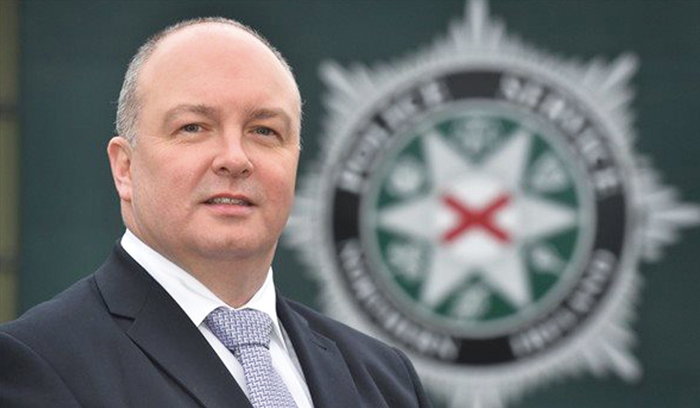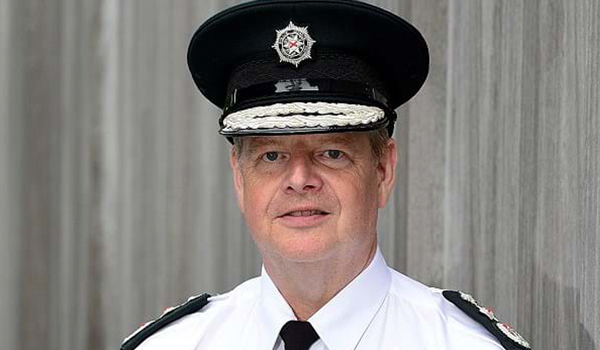PSNI chief constable warns 300 officer jobs could be cut
The chief constable of the Police Service of Northern Ireland (PSNI) has warned that “tough choices will have to be made in the months ahead” with more than 300 police officer posts and 100 police staff positions under threat.
Simon Byrne said the service was facing a £23 million shortfall following the 2021/22 Draft Budget Allocation’ from the Department of Justice, which would “inevitably adversely impact service delivery and operational resilience”.
“The most significant impact will be necessary reductions in both police officer and police staff headcount and recruitment,” said Mr Byrne.
His concerns were raised at a public session of the Northern Ireland Policing Board (NIPB) on Thursday (February 4), and Mark Lindsay, chair of the Police Federation for Northern Ireland, said it “painted a shocking scenario”.
Mr Byrne told the NIPB: “Following the publication of the 2021/22 Draft Budget by the Department of Finance, we have now received formal notification of our ‘2021/22 Draft Budget Allocation’ from the Department of Justice. As anticipated, it sets out an overall flat line ‘main grant’ budget, a roll forward Additional Security budget and EU Exit funding which is some £6 million short of our requirement.
“There is also no confirmation as yet, on funding for legacy, tackling paramilitary activity, Covid-19 or the Gillen Review.
“In the round, our assessment is that we currently face a projected funding deficit of circa £23 million in 2021/22.”
He said the Service Executive Team has already begun to explore opportunities to close this projected funding gap.
“What is clear, even from these early discussions, is that the options available to us are limited and will inevitably adversely impact, to a greater or lesser extent, on our service delivery, operational resilience, capabilities and Policing Plan outcomes,” said Mr Byrne.
He said it was “highly likely”, given the size of the funding gap, that necessary budgetary control measures will include significant reductions in:
- Police officer and police staff headcount;
- Police officer and police staff recruitment; and
- Investment in capabilities and essential infrastructure.
“Rather than increasing police officer numbers towards 7,500 as agreed under the New Decade New Approach, we could therefore instead experience a reduction of more than 300 police officer posts to 6,700 and almost 100 police staff to 2,470 over the financial year. Reductions of this nature will inevitably impact on a range of competing issues and tough choices will have to be made in the months ahead,” said Mr Byrne.
He added: “In terms of recruitment, our emerging planning assumptions are for a 50 per cent reduction in both police officer and police staff recruitment. This will not only adversely impact on those on current recruitment campaign merit lists but, in the medium to longer-term, on service delivery and resilience across our functions. It is foreseeable that progress against the commitments within the Policing Plan to increase organisational representativeness/diversity will be hindered and indeed set back.”
Mr Byrne said while protecting neighbourhood policing will remain a priority, this will inevitably have an impact on other areas of service delivery.
“The critical importance of neighbourhood officers in delivering visible, accessible and responsive policing and building confidence in the Police Service is well understood,” he said. “Consequently, protecting the neighbourhood policing function and its existing resourcing levels will be our priority.
“This will, however, inevitably create knock-on pressures in other areas of service delivery and capability. Those areas likely to be impacted are specialist functions, especially in what is described as the ‘back and middle office’, and the potential closure of front counter/inquiry office facilities in non-custody police stations.
“We are taking steps to quickly assess the consequences of the situation we find ourselves in and make choices about how we use and invest the £758 million we have been allocated from the Executive.”

Mr Lindsay is urging the NIPB and Northern Ireland Executive to take “positive action” to save the 300 officer posts in the PSNI.
“The chief constable has painted a shocking scenario to the Policing Board. We simply cannot afford to lose 300 officers at a time when we are under such intense pressure,” he said.
“Service levels will be impaired if these cutbacks go ahead. The PSNI have made impressive headway on neighbourhood policing, which benefits the entire community, and we don’t want to see those gains undermined or impeded.
“The upshot of such devastating cutbacks is that we will see response times getting longer with the public inevitably seeing noticeable and unavoidable deterioration in service levels. Officers are already being asked to plug gaps and do more with fewer people, and that situation will worsen.”
Mr Lindsay added: “This situation is in stark contrast to every other police force in the UK where there is expansion and investment in policing. Somehow, Northern Ireland seems to be the only region where cuts to policing are being considered. Not only has there been a failure to deliver the 7,500 officers, as promised in the New Decade New Approach Agreement, but now cuts of up to 300 officers are a real prospect. This is a sad indictment on our government who are allowing this situation to develop.”
Mr Lindsay said he was “fully conscious” of the financial pressures being experienced by the Executive, but warned that a failure to invest adequately in policing will only “store up problems for the future, both in terms of community issues and also for the health of officers”.
He said: “Our Justice Minister, Naomi Long MLA and her colleagues in the Executive have to say that this proposed cut is intolerable and unacceptable.
“We’re currently 500 short of the required peacetime level but this will see us take a drastic backward step. Instead of constantly criticising the police, our politicians must recognise what policing can realistically achieve with the resources allocated and fight policing’s corner with strength and conviction.
“I will be asking for an urgent meeting with Ms Long and the First and Deputy First Minister to set out this Federation’s grave concerns and anger. I want to hear from them that they will resist these cuts and instead work to allocate the required levels of resourcing to deliver a first-class service to our communities.”
Mr Byrne welcomed the NIPB’s appointment of Pamela McCreedy as the first chief operating officer for PSNI, which he said will be “absolutely vital to us in addressing the emergent budgetary and transformation challenges we face”.
“I am confident that Pamela’s experience and perspective will ensure that we are significantly better placed to manage change and make optimal use of our resources in the months ahead,” said Mr Byrne.
Ms McCreedy, who has been chief operating officer of the Northern Ireland Audit Office since 2017, was appointed earlier this month and NIPB chair Doug Garrett said she will bring “wide ranging experience to this new role”.


